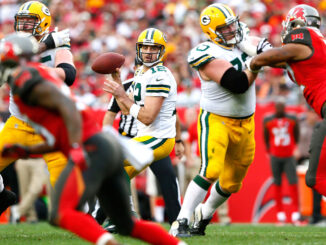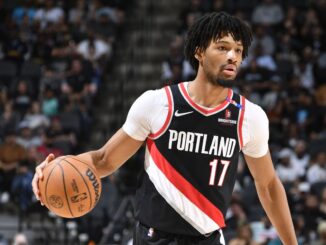
Assuming there aren’t any more unforeseen, society-changing disasters looming on the immediate horizon (deep breath), I’m excited to say we’re less than a week away from the return of the NFL. And guys, America needs the 2020 football season to work. We really, really do.
We’re living through one of the strangest years in memory. From the threat of the COVID-19 pandemic around every corner to the righteous rise of a global Black Lives Matter movement in response to police brutality and racial injustice, as well as the most significant presidential election in U.S. history, we’ve been through a lot this year.
Regardless of your public health or political leanings, the one common ground that everyone could occupy at the same time has been and continues to be, sports.
The NBA has given us a postseason in a bubble, the MLB settled on a 60-game season. The NFL modified its preseason and procedures, and it appears to be on the cusp of unleashing a fan-free season to the world on schedule.
Next Thursday night, September 10th, the Super Bowl Champion Kansas City Chiefs will host the Houston Texans to officially kick off the season.
And then September will be a blur.
We’ll have multiple weeks of brand-new football, the NBA Finals, and the MLB playoffs occurring simultaneously. Depending on your particular sporting preferences, you could have high-stakes sports almost every night.
In fact, in the absence of our standard time experiences in the quarantine, I predict many of us will start to align our mental weekly calendars by TNF, SNF, and MNF.
But then, after about six weeks of sporting nirvana, we’ll have a 2020 NBA champion by mid-October and basketball will end. And then we’ll crown the 2020 MLB World Series champs by Halloween and baseball will end. And finally, having all turned to our much-loved NFL to satisfy our craving for sports, our cultural sanity will be in the hands of the players, coaches, and personnel that populate the 32 NFL teams.
Through exposure and/or poor judgement, each one of them has the ability to theoretically end the NFL season overnight.
They all know that and I’m sure they all take that responsibility seriously, as failure to follow the safety procedures can cost a player their spot on the roster. It already has for Seattle Seahawks undrafted rookie cornerback, Kemah Siverand, who was caught sneaking a companion into the team hotel, violating quarantine rules.
But even if everyone follows the safety protocols and stays healthy for the whole season, what happens the next time a white police officer suffocates an unconscious Black man on the street, shoots a Black woman sleeping in bed, or shoots a Black man in the back seven times in front of his kids?
What happens then? Two significant recent events spring to mind.
The first, of course, was the decision by the Milwaukee Bucks to boycott their game following the police shooting of Jacob Blake in the team’s home state of Wisconsin.
In response, the NBA announced it would postpone Game 5 of three different playoff series, expanding the boycott to the Bucks vs. Orlando Magic, Houston Rockets vs. Oklahoma City Thunder and Los Angeles Lakers vs. Portland Trail Blazers.
By the end of the day, three WNBA, five MLS and three MLB games were called off as athletes and teams joined in solidarity with the Bucks’ protest.
It can be difficult, even paralyzing, to know what are the best actions to take to create change you want to see. What can any individual person do in the face of titanic problems, like police brutality and institutional racism?
It’s a question of how individual actions can snowball into collective activism.
From what I understand, the Bucks’ boycott started when a handful of players, each likely filled with their own blend of frustration, outrage, and pain decided to act. As individuals, these men united their influence and audience to take a collective action of awareness that vastly exceeded what any one of them could have achieved individually.
That’s the power of people—the awesome strength that solidarity demonstrates.
These players took the strongest action available to them, withholding our preferred distraction and directing the nation’s sports fans to look at the real problem. It was bold, powerful, and changed the perception of what athletes can do in America.
And that bell can’t be unrung. Every professional athlete now knows what’s possible.
The second thing that comes to mind is Seahawks head coach Pete Carroll’s recent statement about racism.
In a standard press conference, he stepped to the podium and spoke candidly and passionately for almost 15 minutes about racism. You can read his words in their entirety here, but the thing that caught my ear was Carroll’s acknowledgement of the things we all know are true, but too-often goes unsaid.
“Never before this year has it been so deep and so rich in the exchanges with our players in how they’ve taken this opportunity to teach us more and deeper about what the life of a Black man is like in America—Black men and women. And they’ve been compelled to speak out more than ever; there’s been less fear, less concern—I love that our environment is such that guys are willing to say what they can say and they’re OK about that, which we need to hear, because this has been a process of truth telling and reality checks that just brings me to a point where, as we’re speaking about all that’s going on—and this is about racism in America—white people don’t know enough.”
Even in the context of 2020, have you ever heard a coach speak so openly about the growth he’s experienced as a result of talking and listening to his players? Me neither.
There’s extraordinary power in the masses, but it takes leaders to harness that raw energy and give it guidance until everyone starts rowing the same direction. And that’s how large-scale change is made, by coordinating millions of individual actions into collective reform.
I’m not suggesting that Pete Carroll is the person to lead this movement, he’s not, but he is demonstrating a few critical characteristics that the leaders this movement do need; self-awareness, humility, and empathy.
Carroll knows he’s just an old white guy, but he’s showing everyone who plays football and watches football that even an old white guy can change… And that’s the individual action he can take in this moment.
In the month of November, life in America will be chaotic. The election will happen, the results will be contested, a Coronavirus vaccine will be “coming soon,” and through all of that, only football will be stabilizing the shared mental state of sports fans.
But if and when another horrible murder of a Black citizen at the hands of the police occurs, I expect the players, teams, and league as a whole to likely boycott games in protest. The Bucks’ cleared a pathway for others to follow, if needed.
When they do, I hope there are leaders ready to harness that act for collective good.
If so, we might see new levels of awareness and change from those who are all too comfortable ignoring the problems. But if not, the last remaining tether to “normal” life may snap, forever fracturing a nation’s relationship to Sundays.
We need the NFL to succeed, this year more than ever.




